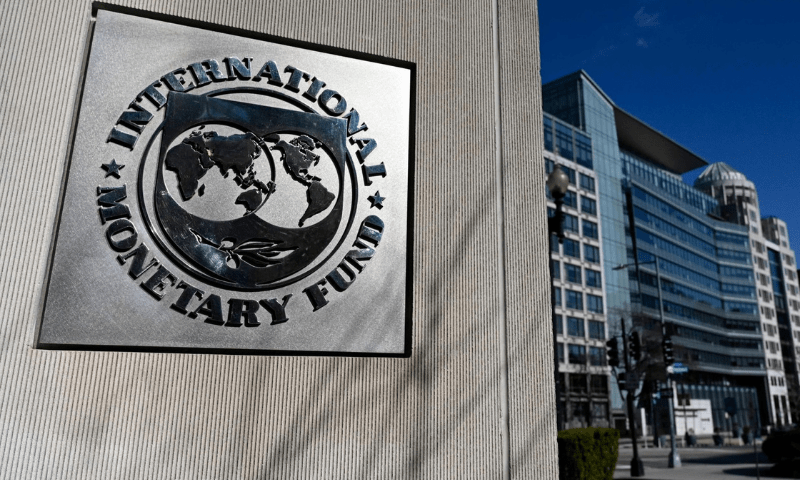• Nine-member Fund mission begins first biannual review of $7bn Extended Fund Facility
• Govt hopes for successful completion of talks, release of $1.1bn tranche within three weeks
• Insists revenue shortfall offset by higher primary budget surplus, better non-tax revenue receipts
ISLAMABAD: As a nine-member mission from the International Monetary Fund (IMF) begins its first biannual review of Pakistan’s $7 billion Extended Fund Facility (EFF), signed in September last year, the government remains optimistic about a successful conclusion to the talks, which would unlock a $1.1bn tranche over the following three weeks.
The IMF delegation, led by Nathan Porter, will hold discussions with Pakistani authorities for 10 days from March 3 to 14, assessing the country’s compliance with quantitative performance criteria, structural benchmarks and indicative targets under the 37-month programme.
A senior government official involved in preparations for the IMF review said there were some technical slippages for certain given deadlines, but they had been overcome with some delays — within weeks or a month.
“The performance review, in principle, is based on the first half of the current fiscal year — July 1 to Dec 31, 2024 — and while some shortcomings could be observed at that time, all those missing links have now been covered,” he said.
The most critical weakness observed so far had been the revenue shortfall against programme targets, the official said. But he hastened to add that this had been more than compensated through a higher-than-targeted primary budget surplus and greater-than-estimated revenue-to-GDP ratio owing to better receipts from non-tax revenues like central bank profit, petroleum levy, telecom profits, etc.
He said the revenue shortfalls were also based on changed ground realities given the changing domestic and international macroeconomic conditions. Last month, the IMF also lowered Pakistan’s growth estimate to 3pc for the current fiscal year, down from 3.2pc it had projected at the time of the EFF signing in September 2024.
Lower-than-estimated cotton and wheat output and struggling industrial output appeared to be key reasons for substantial revenue shortfalls.
Debt maturity
Lately, the government has also been able to prolong the debt maturity period, which was a cause for concern until October last year. The 32-month target for the end-December average debt maturity period now goes beyond 39 months, which simply meant the country was safe in terms of debt repayment period. This was used through surplus cash in the system a few months ago and shifting debt to longer-term products from shorter-debt instruments.
“We have also already met some targets that are due by the end of February. We expect that some overperformances would be able to compensate for underperformances due to legitimate reasons when we sit with the Fund staff for discussions,” the official said.
However, he agreed that relevant authorities would need to be better prepared for the expansion of the tax net in the retail sector and outstanding structural benchmark regarding amendments to the Sovereign Wealth Fund (SWF) law by the end of December. Except for SWF, almost all 17 structural benchmarks, some continuous until the end of February, have been met, albeit some with delays.
The Ministry of Planning has also, of late, informed all the stakeholders, including federal ministries and provinces, about the criteria and methodology for the selection of future Public Sector Development Programme (PSDP) projects.
Starting the upcoming budget, factors to be considered for project selection for PSDP would include strategic and core ongoing projects, ongoing projects with over 80 per cent expenditure with realistic completion estimate, exceptional and high-scoring infrastructure projects, pre-scrutinised approved projects at working-party levels, foreign-funded projects with adequate rupee cover allocation and provincial projects in 20 least-developed districts.
On top of this, climate-responsive and resilient projects would also be part of the PSDP.
Meanwhile, a key structural benchmark under the IMF programme requires the government to amend the Civil Servants Act, 1973, by February 2025. This amendment will mandate high-ranking public officials (BPS 17 to 22) to digitally file asset declarations, including foreign holdings, which will be publicly accessible while ensuring data protection.
According to the IMF, a significant share (around 45pc) of the EFF-envisaged fiscal adjustment (about 3pc of GDP) was legislated upfront as a prior action in federal budget 2024-25, alongside implementation of a large increase in electricity tariffs as part of a new energy policy.
The remaining structural conditionality was oriented towards strengthening the tax system, addressing energy bottlenecks, restructuring or privatising public sector enterprises, strengthening central bank operational independence, enhancing financial sector stability and protecting the most vulnerable.
Tax base expansion
Just before the IMF mission’s visit, the lender reiterated last week that its programme aimed to raise Pakistan’s notably low tax-to-GDP ratio by 3pc of GDP while improving the fairness and efficiency of the tax system by broadening the tax base and improving tax compliance.
Three key areas of focus include: expanding direct taxes by bringing retailers, property owners and agricultural income into the tax net; rationalising personal and corporate income taxes by reducing exemptions and streamlining rates in the general sales tax system; and enhancing Federal Excise Duty coverage and eliminating tariff exemptions to increase customs revenue.
Published in Dawn, March 3rd, 2025


